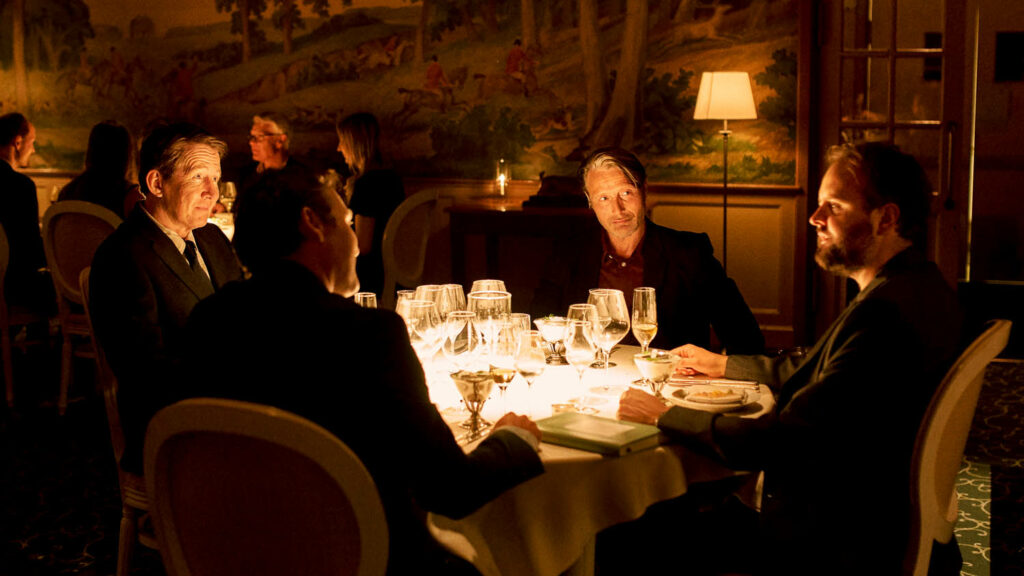BFI’s London Film Festival is in town! The FilmSoc Blog is back for the 64th edition of one of Europe’s largest film festivals, delivering a first look at the hits and misses of the 2020-21 season.
Milo Garner turns theory into practice with his review of London Film Festival’s Best Film winner.
Alcohol! The great Moloch! Much as we partake in that brawny substance, we are all temperates at heart. To be drunk is joy, to be a drunk is penury. The lost souls sprawled about Wetherspoons, or the intoxicants roaming quiet streets: we do not question their origin. A discarded bottle of White Ace, dismay itself. Drinking is commonplace, good, honest. Drinking is dangerous, uncouth, destructive. This tension informs the popular discourse and the popular culture. How often do we see a perfect movie star neck a bottle of Bud Light and know, instinctively, that this signals his darkest moment? Why is it that the darkest moments of so many coincide with the imbibing of Bud Light? These are complex, multifaceted questions. Questions I cannot hope to address in this brief report. Vinterberg decides not to address them at all. Where alcohol is typically offered a special sequester – a drug, but not a drug – Vinterberg breaks this feeble wall. Alcohol is, for him, returned to the province of psychoactive substances. Alcohol becomes less a signifier of particular joy or particular misery, than a chemical compound with particular functions. Another Round envisages alcohol as a lever that might push against the fulcrum of human rigidity.
In so envisaging, Vinterberg must approach and obliterate the popular myths of right conduct. His revisionism is funnelled through Martin – failing history teacher, soon to become high-functioning drunk. Churchill, Hemingway, Tchaikovsky – their qualities are not held in opposition to their alcoholism, but in tandem. They did not succeed in spite of their addiction, but through it. The exact mechanism of alcohol, in some shape, informs their practice and their capacity. In Churchill’s nous; Hemingway’s sharp brevity; Tchaikovsky’s moving loquacity: alcohol flows vividly. Additional exemplars can be provided ad infinitum: Townes van Zandt, the great cowboy-poet, was once known to drink a bottle of vodka a day. A tragic, eviscerating habit. And one that aided in the production of the most impressive, romantic, devastating catalogue of country songs ever written. To separate the man from the addiction is shortsighted; it and his genius were consubstantial. The indispensability of substance abuse with regard to other arts is less contestable: for some years a non-existent ‘druid-wizard’ was an official member of The Doors; before this, bebop subsisted entirely on a subtle bouquet of tobacco and heroin. Alcohol’s association with course stupidity need not rob it of the great wonders (and terrible evils) it has so dutifully subsidised.

Vinterberg positions his narrative according to these fundamentals: an experiment conducted by four miserable schoolteachers, on the precept that the human body is always 0.05% below its required level of blood alcohol. With rigorous specificity, they decide to increase their alcohol consumption so as to maintain this new base level throughout the working day. The effects are transformative: these drifting, uninterested pedagogues seem able to cross the line between distance and charisma. A new, sodden enthusiasm slips into their lives and their profession. These advancements speak to more than the effect of alcohol: schooling becomes an auxiliary subject, whereby the traditional lacuna between student and teacher – the emphasis on sturdy lesson plans and subordinated hierarchies – is made a mockery. Alcohol is, in this case, less the solution than the revelation. Not an awfully nuanced investigation into educational reform, but I’ll take what I can get. Though the film’s premise, for its delicious, Hollywood-ready potential, is not completely original. In a classic Mitchell and Webb Show sketch a similar idea is propounded: that mankind is at its most remarkable after having drunk just under two pints of beer. At which point he is a great deal more charming, capable, and attractive. To finish the second pint spells disaster: the fine line between controlled tipsiness and drunken madness lies ever in the dregs.
This same tension is exploited throughout Another Round, the teachers increasing their dosage, seeking their optimum. A dangerous game. Hence comes the requisite subplot of the man who Takes It Too Far. It would presumably be improper to make a film exalting alcohol without delving into the inevitable victims of its pervasive grip; though there is no escape from the roteness in so doing. The notable distinction is in how Vinterberg positions this edgewise tragedy: it does not become the central event, nor does it linger (obviously) as salutary message. Instead it appears as one element in a multiplicity, a possible – but not ineluctable – outcome. In seeing the misery that alcohol is liable to encourage, one must also acknowledge those other things born therefrom. Hemingway’s blasted brains beside his astounding textual corpus, for one slightly glib example. More compelling yet: Schubert’s Fantasie in F Minor. A piece of music so utterly beautiful, so entirely transfiguring, that the only reasonable action after hearing it is to immediately kill oneself. Because there is no greater ecstasy, no deeper remit of feeling than that offered by such beguiling, encompassing music. I only stay my hand for cowardice, and for curiosity. We are all cowards in the face of such music. How can any man deny the substance that fuelled such astounding insight? Vinterberg finds that he cannot. Though there is an ambiguity in his celebrations. The film closes on an especially fascinating image: Mads Mikkelsen dancing with total precision and gay abandon. Everyone is very happy. One feels the unavoidable American remake will end similarly, though with obligatory attempts to one-up the exuberance. Though the last shot itself is curious. A freeze frame of Mikkelsen leaping through the air, into the dock. A picture of liberation, actualization. But also a mirror: the gap between leaping jubilation and the drowned man is, here, a few feet. The great achievements of alcoholics rarely stay their grisly, sickly ends. Though let this review speak to Vinterberg’s thesis. I am writing it, and here concluding it, while inebriated. Theory meets praxis.





Big words no grade at the end all I can say is why do they pay you